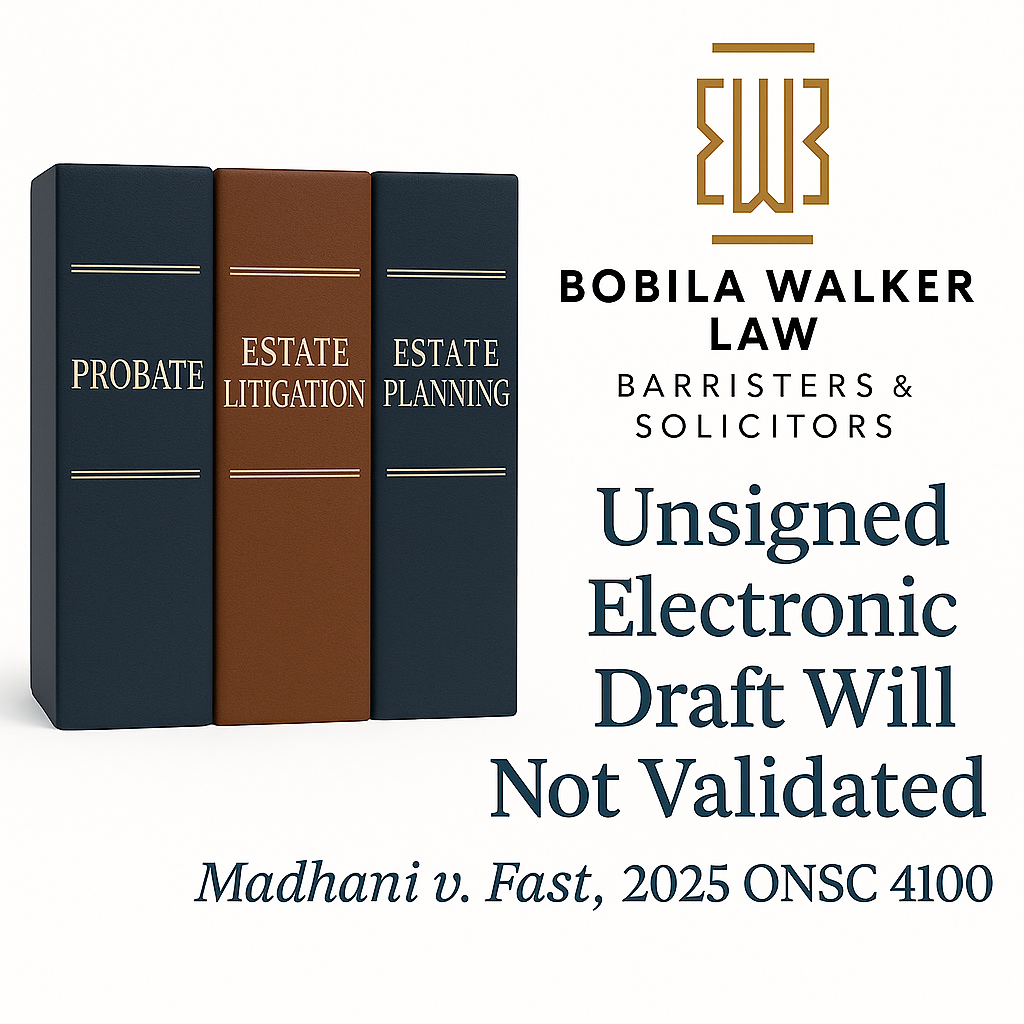In Ontario, dying without a will—known as intestacy—can trigger a cascade of legal complications, including family disputes, court battles, and unexpected inheritance outcomes. At Bobila Walker Law, our estate litigation experts frequently handle cases where intestate estates lead to prolonged litigation, draining resources and fracturing relationships. If you’re searching for “dying without a will Ontario litigation,” “intestacy disputes Ontario,” or “estate challenges intestacy,” this guide breaks down the process, key rules, recent 2025 changes, and the litigation pitfalls you need to know. We’ll also explore how dependant relief claims and other disputes can arise, emphasizing why proactive estate planning is crucial to avoid courtroom drama.
As experienced Ontario estate lawyers, we help clients navigate these issues daily. Whether you’re a surviving spouse facing exclusion or a family member contesting distributions, understanding intestacy can empower you to protect your rights.
What Is Intestacy in Ontario and Why Does It Often Lead to Litigation?
Intestacy happens when someone dies without a valid will, leaving Ontario’s Succession Law Reform Act (SLRA) to dictate asset distribution. This rigid framework prioritizes legal spouses and blood relatives, often ignoring personal wishes, common-law partners, or blended family dynamics. The estate administrator—usually the spouse or next-of-kin—must seek court approval via a Certificate of Appointment of Estate Trustee Without a Will, a process that can spark disputes if family members disagree on who should administer the estate.
Litigation frequently arises here: Heirs may challenge the administrator’s appointment, allege misconduct, or dispute asset valuations. Court involvement can delay distributions for years, with legal fees eroding the estate’s value. In 2025, with rising property values and complex family structures, intestate estates are prime for conflicts, as seen in recent cases like blended families fighting over preferential shares.
How Are Assets Distributed Under Ontario’s Intestacy Rules?
The SLRA provides a hierarchical distribution, but these “one-size-fits-all” rules often fuel litigation when they don’t align with the deceased’s implied intentions or family needs. Here’s how it typically works:
1. Surviving Spouse, No Children
The legally married spouse inherits everything. However, if there’s ambiguity about marital status (e.g., separation), disputes can lead to court challenges.
2. Surviving Spouse and Children
-
The spouse gets a $350,000 preferential share first (increased from $200,000 for deaths after March 1, 2021).
-
Remaining assets are split: 50/50 with one child, or one-third to the spouse and two-thirds equally among multiple children (per stirpes for predeceased children’s shares).
This formula can spark lawsuits in blended families, where stepchildren feel excluded or biological children argue the split is unfair. Example: In a $600,000 estate with a spouse and three children, the spouse receives $350,000 plus one-third of the $250,000 remainder ($83,333), totaling $433,333. The children share $166,667, but if one child contests the valuation, litigation ensues.
3. No Surviving Spouse, But Children
Assets divide equally among children (per stirpes for descendants). Disputes often involve proving parentage or excluding non-biological heirs.
4. No Spouse or Children
The estate goes to parents, siblings, nieces/nephews, or distant relatives—or escheats to the government if none exist. This can lead to “heir-hunting” disputes and court petitions from overlooked claimants.
Key 2025 Changes: Separated Spouses and Heightened Litigation Risks
Effective January 1, 2025, amendments to SLRA Sections 17 and 43.1 treat separated spouses as divorced for intestacy purposes, revoking their inheritance rights unless reconciled. Separation is defined by living apart due to breakdown, with no reconciliation prospects—often evidenced by agreements or orders.
This change has already sparked litigation: Separated spouses may challenge the “separation” status in court, arguing for inclusion, while other heirs contest to exclude them. If you’re separated, failing to update plans could lead to costly dependant relief claims.
Common-Law Partners in Intestacy: A Litigation Hotspot
Common-law partners have no automatic rights under intestacy, regardless of relationship length. They must prove dependency to claim support via Part V of the SLRA, requiring a court application within six months of probate (or estate administration). This often results in bitter disputes, as seen in cases where partners battle blood relatives over co-owned property or financial support.
Dependant Relief Claims: Challenging Intestacy Through Litigation
Even in intestacy, dissatisfied dependants (spouses, children, parents, or others financially reliant on the deceased) can file a dependant’s relief claim under SLRA Part V. Courts assess if “adequate provision” was made, considering factors like the dependant’s needs, estate size, and relationship length. Successful claims can redistribute assets, but they involve evidence-heavy trials, expert testimony, and high costs.
Common scenarios: Common-law partners seeking support, adult children claiming undue hardship, or excluded stepchildren. Deadlines are strict—six months from estate trustee appointment—so missing them forfeits rights.
Common Intestacy Disputes and Litigation Pitfalls in 2025
Intestate estates are rife with conflicts:
-
Administrator Challenges: Family members may litigate over who manages the estate, alleging bias or incompetence.
-
Asset Valuation Fights: Disputes over property appraisals can lead to court-ordered assessments.
-
Family Tensions in Blended Families: Step-relatives often feel shortchanged, prompting will contests or relief claims.
-
Tax and Debt Disputes: Unresolved liabilities can spark lawsuits among heirs.
-
Delays and Costs: Litigation can extend “executor’s year” far beyond, with fees exceeding 5-10% of the estate.
In 2025, with economic pressures, these disputes are on the rise—avoid them by drafting a will.
Why a Will Prevents Litigation: Protect Your Legacy
A will lets you dictate distributions, name guardians, and minimize taxes—sidestepping intestacy’s rigid rules. Without one, courts decide, amplifying risks of disputes, delays, and unintended heirs.
How Bobila Walker Law Handles Intestacy Litigation in Ontario
At Bobila Walker Law, our seasoned estate litigators specialize in intestacy disputes, dependant relief claims, and administrator challenges. We’ve successfully resolved complex cases, from securing support for common-law partners to defending against frivolous claims. If you’re facing an intestate estate battle or want to prevent one through robust planning, contact us for expert guidance.
Don’t let intestacy ignite family feuds—schedule a consultation today. Call Bobila Walker Law at 416-847-1859 or email us at info@bobilawalkerlaw.com.





